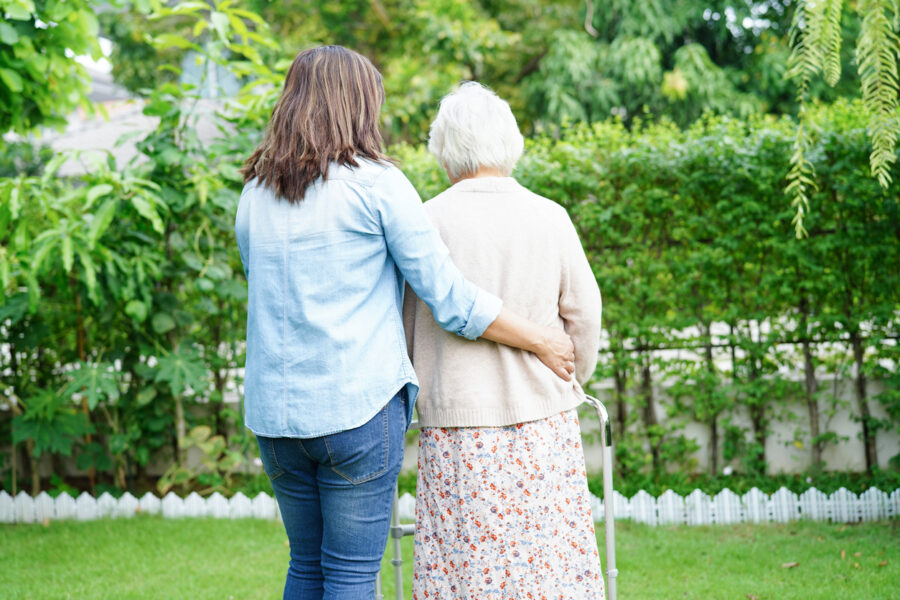Have you noticed that as your loved ones get older, you become more anxious about their health and welfare? Perhaps you’ve found yourself feeling angry that their health is declining or resentful that they require additional support? Maybe you’ve found yourself feeling sad or nostalgic as you watch them interact with your children, when you’ve never felt that way before. If any of these situations describe your feelings, you could be experiencing anticipatory grief.
Anticipatory grief, or grieving a loss before the loss actually happens, is common among family caregivers as their loved ones age. While everyone experiences anticipatory grief differently, some common phases and feelings are worth noting if you experience them. Feelings associated with anticipatory grief can sometimes cause strain in relationships, anger, and even an increased risk for physical or mental health decline.
Signs of Anticipatory Grief
Anticipatory grief is different from traditional grief because symptoms occur before the loss actually happens. This means it can be difficult to notice anticipatory grief feelings because you (and those around you) haven’t actually lost your loved one yet.
For example, if your Mom died in August and you’re suddenly sobbing quietly at your work desk in September, you and your co-workers know that you are experiencing grief after losing your Mom. However, if your Mom didn’t pass away but you she is living in the advanced stage of Parkinson’s disease, your tearfulness at your desk might be chalked up to work stress, or being overly emotional or sensitive. This means that it can be difficult to receive the support, grace, and understanding you need to cope with your anticipatory grief.
The first step in getting the support and grace you need is understanding what anticipatory grief can look like:
- Loss of appetite
- Trouble concentrating, feeling distracted, or experiencing brain fog
- Quick and sudden mood swings
- Irritability and anger, sometimes directed at no one in particular
- Waves of sadness, hopelessness, or loneliness
- Isolating yourself from family, friends, and community
- Sleep changes, ranging from insomnia to sleeping too much
- Anxiety
Benefits of Anticipatory Grief
While it can seem strange, there are some benefits that can come with anticipatory grief. For example, you might be able to emotionally work through the reality of your loved one’s diagnosis. This might lead you to set up support services, such as hospice and/or palliative care, sooner. These end-of-life services can benefit your loved one as well as your family as you all work toward a comfortable and dignified death.
You can also focus on creating meaningful memories and moments, relishing in the joy of having your loved one here, when you understand they will not be alive forever. This can let you put aside some of the “busy” caregiver work and instead focus on being intentional with your time while your loved one is awake and alert. This might mean setting aside the laundry to instead have a cup of tea with your mom.
Understanding anticipatory grief can also give you insight into why you are acting the way that you are, as well as why others around you are acting the way they are. For example, you might be able to respond with kindness and patience instead of anger when you realize that your brother’s outburst at dinner is likely rooted in grief. Additionally, you might be able to understand that you aren’t mad at your dad but instead are mad at the situation and his diagnosis.
Coping with Anticipatory Grief
Anticipatory grief, just like traditional grief, will come in waves and is often unpredictable in how it will show up in your daily life. To make matters even more complicated, anticipatory grief ends when the loss occurs, which means you simply transition into traditional grief. It’s a lot of feelings and sadness for anyone to cope with.
Here are a few ways you can take care of yourself when you’re experiencing anticipatory grief:
- Schedule respite care, especially if you take on family caregiver tasks and responsibilities
- Find the resources around you to build up support, including caregiver support groups and services through hospice and palliative care agencies that your loved one uses
- Be involved with end-of-life decisions with your loved one. It is especially helpful if they are still able to advocate for their preferences and wishes; hearing their wishes can affirm that you are making the right decisions when the time comes
- Create your own end-of-life plan and get your estate in order. Believe it or not, this process can give you back a sense of control and ensure you are making things as easy as possible for your children
- Find a counselor or therapist if you don’t already see one. Even one visit every few weeks can be beneficial in helping you sort out and name your feelings, as well as develop customized coping skills that you can use when you’re feeling overwhelmed
- Try grieving in small doses, which means allowing yourself to feel your feelings for a set amount of time and then redirecting your brain to another more pleasant topic. This is sometimes called confronting and restoring, and it can be a helpful way to process feelings without getting “stuck” in them
- Focus on healthy habits, like exercising daily, drinking plenty of water, and eating healthy food. These habits can support your health so that you are then able to cope effectively with feelings of grief
- Avoid unhealthy coping mechanisms like turning to alcohol or drugs for relief
- Keep your primary care physician in the loop with what is happening in your life so that they can watch for signs of caregiver burnout, anticipatory grief, and other factors that might negatively impact your mental or physical health
Anticipatory grief is real, and if you’re feeling it, focus on taking care of yourself and getting the support you need to employ healthy coping skills.















